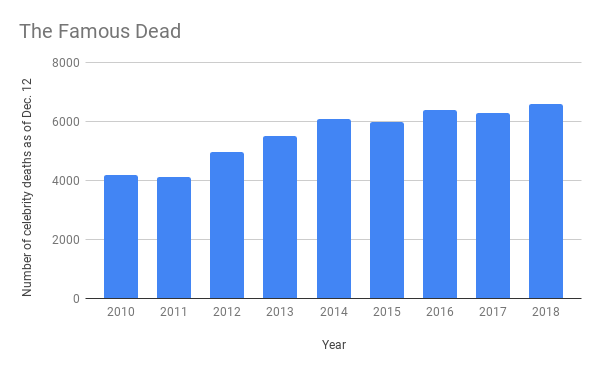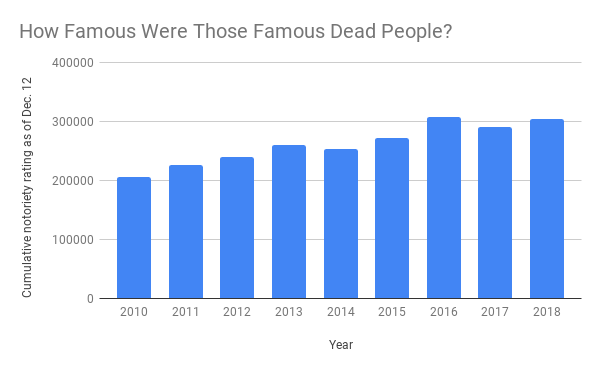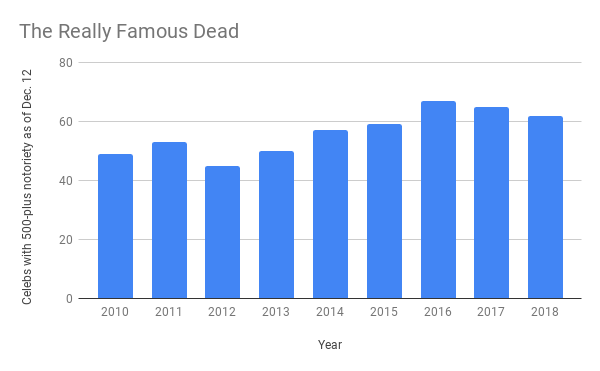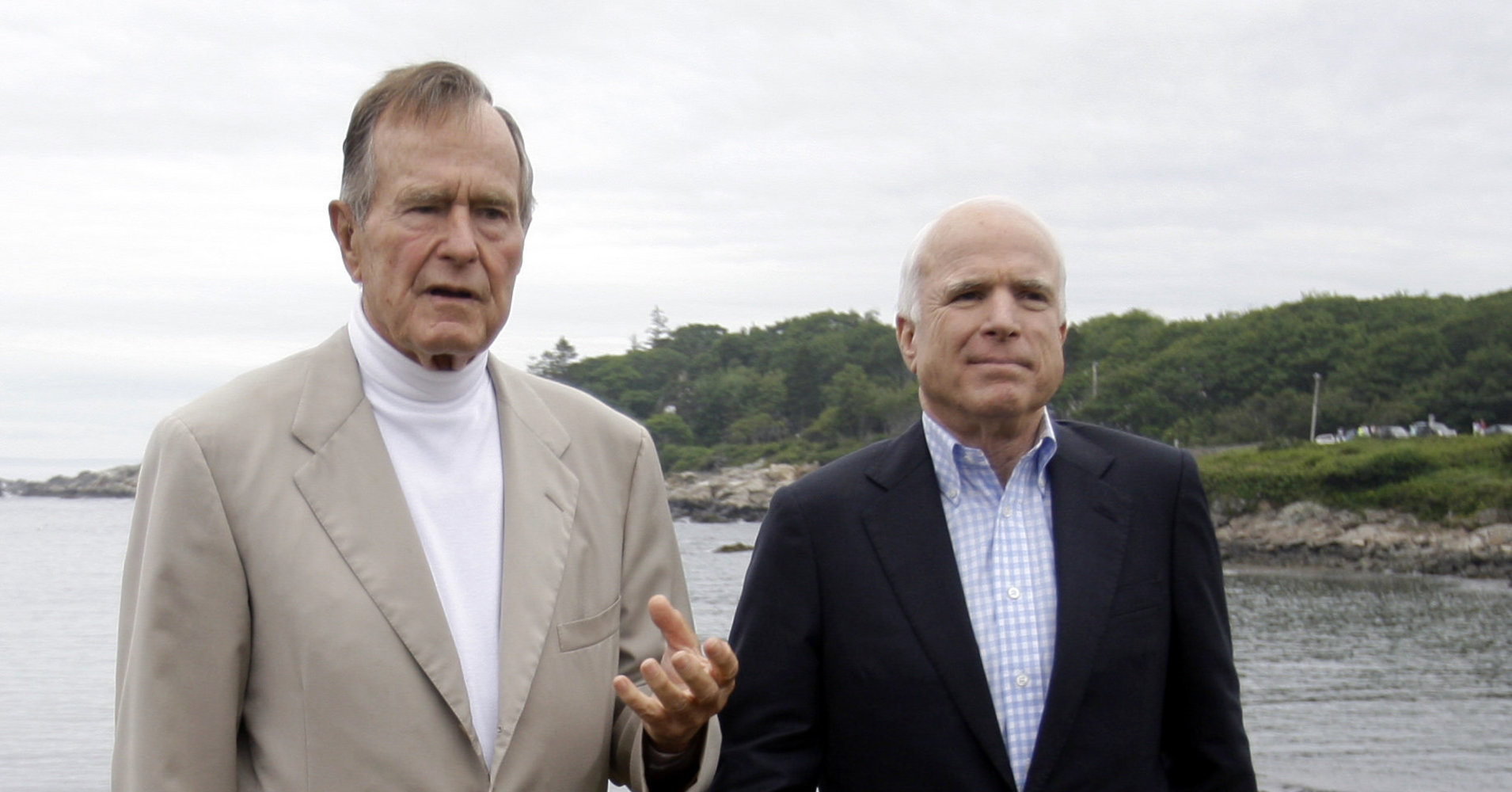[ad_1]
As we wave goodbye to a fairly hideous 2018, we also have an opportunity to reflect on the famous people who won’t be joining us in 2019, the lucky bastards.
But we’re not here to talk about the lives they led, the work they did, the civilians they killed with GBU-27 strikes on an air-raid shelter. We’re here to talk about their fame. Specifically, we’re here to determine who was the most famous person to die in 2018 and whether more famous people died this year than in previous years.
The first problem when building a model for this is defining the parameters: Who exactly counts as a celebrity? Sure, we could simply pick whoever we remember dying, but this is science — which is why we turned to every serious academic’s favorite tool: Wikipedia.
Wikipedia gives us a relatively neutral definition of a “celebrity.” To get your own Wikipedia page, you need to be considered “notable” by the site’s thousands of editors and contributors. And because each page will have gone through a decision process, this gives us a baseline of sorts — an authority to point at to determine whether a lower-league sports person or a reality TV star really counts as a celebrity.
Wikipedia also, helpfully, lists deaths in neatly organized categories, too.
So having crunched this data, we can now say that as of Dec. 12, 6,576 famous people have died. This is actually a record if you compare to the 345th day into each year for the previous seven years, and it reveals that 2018 is the most devastating year for celebrities in recent times. Even more so than 2016, during which it often felt as if beloved celebrities — Carrie Fisher, David Bowie, Prince — were dropping dead every day.

Obviously there are a bunch of caveats and health warnings that apply to this sort of data. It inevitably reflects the English-speaking world. And it is impossible to say how much Wikipedia editing activity has changed over time — although focusing on 2010 onward makes a degree of intuitive sense to us, as by then, Wikipedia was already expansive and was being updated in real time. It also reflects Wikipedia’s own biases: Let’s face it, if a minor character from “Star Trek” dies, you just know they’re going to have a large Wikipedia presence.
Still, this feels like a pretty good measure of the state of celebrity death. The slow increase, over the eight years studied, may hint at the slow increase in the sheer quantity of celebrities over time.
What this graph doesn’t tell us, however, is who specifically was the most famous person to die in 2018.
To calculate this, we need a means to measure an individual’s level of fame. And this is where we can borrow a trick from Google. The search engine ranks results by counting the number of pages linking into a given page — the theory being that the more pages linking there, the more authoritative it is. And using this Wikipedia data, we can do something similar: We can count the number of other Wikipedia pages linking to the dead person. The bigger the number, the bigger the impact that person had on our world.
For example, 3,012 other Wikipedia pages link to Stan Lee’s page, indicating his enormous influence on comics, publishing, movies, TV and culture in general. By contrast, only 28 other pages link to the page for actor Al Matthews — who died this year, and who is best known for playing Gunnery Sergeant Apone in “Aliens” — suggesting he is less well-known.
When we weight by notoriety, then, here are the 20 most famous people to have died this year — at least up until Dec. 12 (there are still a few more days for the queen of England to catch a cold).
|
Name |
Date of death |
Who? |
Score |
|
|
1 |
George H. W. Bush |
Nov. 30 |
Former president |
5800 |
|
2 |
John McCain |
Aug. 25 |
Senator |
4575 |
|
3 |
Aretha Franklin |
Aug. 16 |
Musician |
3063 |
|
4 |
Stan Lee |
Nov. 12 |
Comics legend |
3012 |
|
5 |
Atal Bihari Vajpayee |
Aug. 16 |
Former Indian prime minister |
2049 |
|
6 |
Kofi Annan |
Aug. 18 |
Former UN sec’y general |
1932 |
|
7 |
Sir Charles Kao |
Sept. 23 |
Scientist |
1543 |
|
8 |
Ursula K. Le Guin |
Jan. 22 |
Author |
1540 |
|
9 |
Stephen Hawking |
March 14 |
Scientist |
1513 |
|
10 |
Paul Spudis |
Aug. 29 |
Scientist |
1502 |
|
11 |
Burt Reynolds |
Sept. 6 |
Actor |
1288 |
|
12 |
Billy Graham |
Feb. 21 |
Evangelist |
1167 |
|
13 |
Harlan Ellison |
June 28 |
Author |
1163 |
|
14 |
Neil Simon |
Aug. 26 |
Playwright |
1117 |
|
15 |
Paul Allen |
Oct. 15 |
Microsoft co-founder |
1064 |
|
16 |
Willie McCovey |
Oct. 31 |
Baseball player |
1056 |
|
17 |
Avicii |
April 20 |
Musician |
986 |
|
18 |
Cecil Taylor |
April 5 |
Musician |
904 |
|
19 |
Randy Weston |
Sept. 1 |
Musician |
883 |
|
20 |
Philip Roth |
May 22 |
Author |
876 |
Unsurprisingly, George H.W. Bush is at the top of the list. Sir Charles Kao is perhaps the most unfamiliar name on the list, but he definitely deserves his place: He’s the father of fiber-optic communication, which is how you’re able to read this thing you’re reading at the moment. Philip Roth was eulogized and think-pieced all across the media, but here he is several spots below another author, Ursula K. Le Guin, the great sci-fi Grand Master, suggesting Wikians’ tastes may not always line up with those of the prevailing media culture.

Plotting these weighted scores on a graph also reveals how similar 2018 was to 2016. 2016 might have taken Bowie and Prince, but love ’em or loathe ’em, there’s no denying that H.W. and John McCain were big hitters, too.
So why didn’t it feel this way? Why didn’t it feel as if we were constantly in mourning? One possibility: In 2018, fewer really famous people died than in 2016, and indeed, 2017.
If you filter the pool of dead celebrities to remove everyone with fewer than 500 other Wiki pages linking to them — which gets rid of all of the obscure Bulgarian footballers and minor British historians — the results look like this:

In other words, while more celebrities died in 2018 than in any other year since 2010 (at least according to this methodology), slightly fewer really, really famous people did.
James O’Malley tweets as @Psythor. This piece is the 2018 edition of a series that first began on Gizmodo UK.
[ad_2]
Source link

